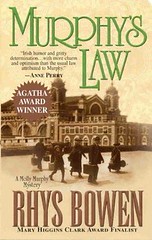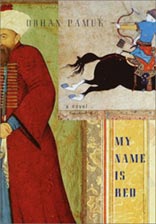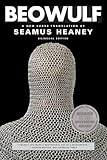
What if you lived your life for just one person? And that person lived just for you, so you were ‘each other’s world entire’? I think there’s a romantic sense of that feeling, of being consumed by a new love affair, a new baby, a feeling that without that person, life would not be worth living. But we all have other reasons to live, whether we acknowledge them or not. There is family, friends, helpful strangers, animals, nature, books, work, music, whatever it is that gets you through. But what if we didn’t? No family, no friends, no helpful strangers, no faith in God, not enough food, no clean water, no trees, no animals, no blue sky? What if all you had was one other person, and a long, difficult journey, in a world where snow comes down gray, where every living thing, save a few wandering humans, has been killed, either by a nuclear bomb, or by the ferocious first years following the explosions? Would we want to travel that road?
That is the road on which the unnamed father and son must travel in
The Road, a post-apolyptic novel that is so bleak, so sad, that there were pages when I had to close the book and struggle not to cry. But it’s so well written, I found myself getting past the nausea brought on by some of the images, and coming back to the story.
The man and the boy are trying to stay alive. The man wants to get them to the warmer weather at the coast, and further south, so that they won’t freeze to death come winter, which seems to come earlier every year. They have to travel the roads with care, always in the desperate search for food, trying to stave off starvation, always on the lookout for ‘bad guys’, marauders who resort to cannibalism and slavery in order to stay alive.
In the evening they tramped out across a field trying to find a place where their fire would not be seen. Dragging the cart behind them over the ground. So
little of promise in that country. Tomorrow they would find something to eat. Night overtook them on a muddy road. They crossed into a field and plodded on toward a distant stand of trees skylighted stark and black against the last of the visible world. By the time they got there it was dark of night. He got a fire going. The wood was damp but he shaved the dead bark off with his knife and he stacked brush and sticks all about to dry in the heat. Then he spread the sheet of plastic on the ground and got the coats and blankets from the cart and he took off their damp and muddy shoes and they sat there in silence with their hands outheld to the flames. He tried to think of something to say but he could not. He’s had this feeling before, beyond the numbness and dull despair. The world shrinking down about a raw core of parsible entities. The names of things slowly following those things into oblivion. Colors. The names of birds. Things to eat. Finally the names of things one believed to be true. More fragile than he would have thought. How much was gone already? The sacred idiom short of its referents and so of its reality. Drawing down like something trying to preserve heat. In time to wink out forever.
The man promised the boy that they are the ‘good guys’, they they carry the fire with them; that they will not eat other people, even if it means their own death. He tries to maintain their own humanity, and for the father, it is as much humanity as he has left. Having the son as his ‘world entire’ means that nothing else matters. Just keeping his son alive. Not others who they meet on the road, some who desperately need help. Simply put, if the man and the boy stop to help, if they share their food and energy, they will die. That’s all.
The dialog is sparse, and reveals the honesty and love between the father and son…and at times, it is the dialog that is the most brutal and honest.
It was harder going even than he would have guessed. In an hour they’d made
perhaps a mile. He stopped and looked back at the boy. The boy stopped and
waited.
You think we’re going to die, dont you?
I dont know.
We’re not going to die.
Okay.
But you dont believe me.
I dont know.
Why do you think we’re going to die?
I dont know.
Stop saying I dont know.
Okay.
Why do you think we’re going to die?
We dont have anything to eat.
We’ll find something.
Okay.
How long do you think people can go without food?
I dont know.
But how long do you think?
Maybe a few days.
And then what? You fall over dead?
Yes.
Well you dont. It takes a long time. We have water. That’s the most important thing. You dont last very long without water.
Okay.
But you dont believe me.
I dont know.
He studied him. Standing there with his hands in the pockets of his outsized pinstriped suitcoat.
Do you think I lie to you?
No.
But you think I might lie to you about dying.
Yes.
Okay, I might. But we’re not dying.
Okay.
Keeping his emaciated son alive is all that the man has left. The goal, and the love for his son, his need to protect his son against all threats, his fear that someday, he will have to kill his son, in order to protect him from a fate worse than death. Already, every night as he tries to sleep, hungry, cold, and scared, he envies the dead. The boy, born into the post nuclear world, craves a bit more humanity than this bleak survival. A bit more assurance that their struggle hasn’t turned them into ‘the bad guys’.
I found this story to be harrowing, devastating, and still, not without its own beauty, and even a tiny glimmer of hope. Cormac McCarthy won the 2007 Pulitzer Prize for The Road, and I read it as part of my
award winners book challenge.












 I read
I read 

 This book reminded me a bit of To Kill a Mockingbird in its setting and main characters. Both books takes place in the south. While the core themes of it differ, both are essentially stories about growing up. Katherine Paterson seems to capture childhood so well. When Jess and Leslie create and explore Terabithia, I remember my own childhood of imagining other worlds, fantastic creatures and adventures. They even refer to Narnia. I remember reading that series, and trying desperately to find a wardrobe. I’m sure I hid in a wardrobe once, but alas, not gateways. The only thing that bothered me about this book is that I predicted the ending early on, and initially found it a bit contrite. I do not blame the book because if I had read it when I was 10, I probably would not have found it contrived since now I’m marred by years of books, movies and television. It’s hard for me to review very well written books, especially children’s ones such as this because it just comes down to the writer’s ability to write prose and experiences that capture readers. Paterson allowed me to be nostalgic, and I only wish I had read this when I was younger because I know I would have loved it and understood it even more than I do now.
This book reminded me a bit of To Kill a Mockingbird in its setting and main characters. Both books takes place in the south. While the core themes of it differ, both are essentially stories about growing up. Katherine Paterson seems to capture childhood so well. When Jess and Leslie create and explore Terabithia, I remember my own childhood of imagining other worlds, fantastic creatures and adventures. They even refer to Narnia. I remember reading that series, and trying desperately to find a wardrobe. I’m sure I hid in a wardrobe once, but alas, not gateways. The only thing that bothered me about this book is that I predicted the ending early on, and initially found it a bit contrite. I do not blame the book because if I had read it when I was 10, I probably would not have found it contrived since now I’m marred by years of books, movies and television. It’s hard for me to review very well written books, especially children’s ones such as this because it just comes down to the writer’s ability to write prose and experiences that capture readers. Paterson allowed me to be nostalgic, and I only wish I had read this when I was younger because I know I would have loved it and understood it even more than I do now.

 Murphy's Law / Rhys Bowen
Murphy's Law / Rhys Bowen



 I never studied this in school, but I think I would have liked it more if a passionate English teacher had done so especially with this translation of the story. My mind wandered quite a bit while reading this text. It was not the most enjoyable thing I’ve read in awhile. On the other hand, I really appreciated the translation by Irish poet Seamus Heaney. There were some margin notes and the original text on the left page to guide you through the book. There is something in the prose of the translation and the arrangement of the text that makes me aware that Heaney is a poet, and this work has been well thought out. Even with a good translation, this is still Beowulf. I think part of the problem is that these stories are so different from present conventions and not created originally for a literary text form or modern prose. I would have much rather listened to this story as it is meant to be. These stories are meant to be recounted by a talented storyteller with a booming bard voice. I’m pleased to say that Seamus Heaney has recorded an audiobook, and exerpts from it can be heard at
I never studied this in school, but I think I would have liked it more if a passionate English teacher had done so especially with this translation of the story. My mind wandered quite a bit while reading this text. It was not the most enjoyable thing I’ve read in awhile. On the other hand, I really appreciated the translation by Irish poet Seamus Heaney. There were some margin notes and the original text on the left page to guide you through the book. There is something in the prose of the translation and the arrangement of the text that makes me aware that Heaney is a poet, and this work has been well thought out. Even with a good translation, this is still Beowulf. I think part of the problem is that these stories are so different from present conventions and not created originally for a literary text form or modern prose. I would have much rather listened to this story as it is meant to be. These stories are meant to be recounted by a talented storyteller with a booming bard voice. I’m pleased to say that Seamus Heaney has recorded an audiobook, and exerpts from it can be heard at 

